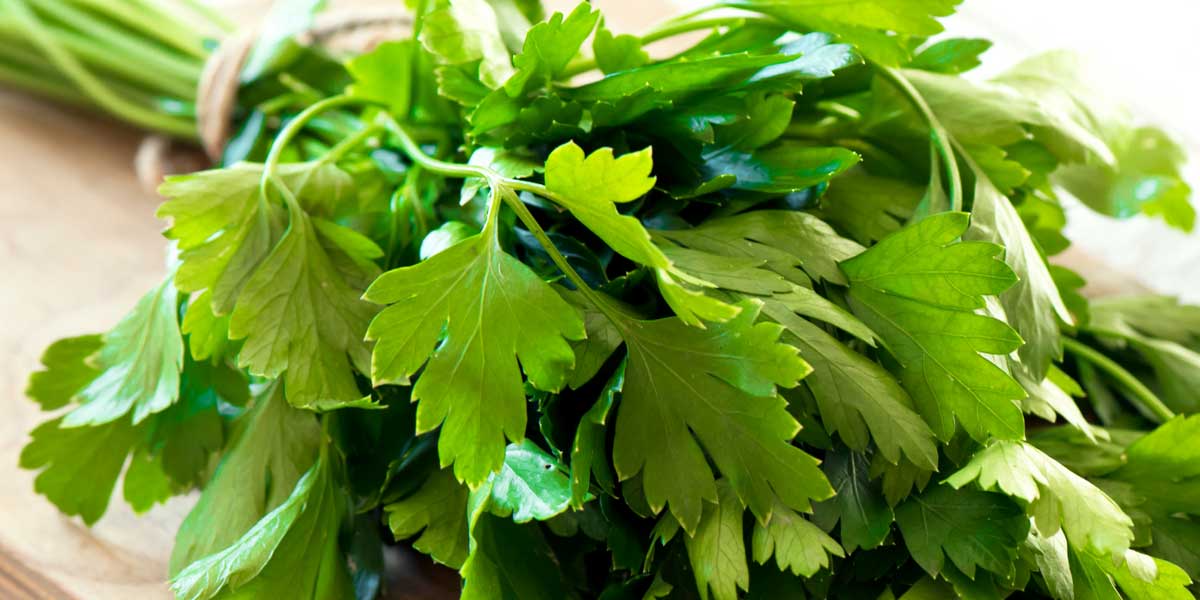Did you ever think that a simple garnish herb could actually become a popular choice by health experts?
Parsley, bright and green in colour, often used as culinary herb or dried spice. We never thought of it beyond garnishing our plates, but today it is gaining popularity for its nutritional value and ability to fight diseases. Parsley, a name derived from Greek, which means rock celery. Apart from making your plate look pretty, its flavour can liven up even a boring meal. Once you start using it, you might consider keeping a plant potted near your kitchen. Before getting to the benefits of adding parsley to your diet, let’s take a look at its nutritional value: A 1/2 cup (30 grams) of fresh, chopped parsley provides (3Trusted Source):
- Calories: 11 calories
- Carbs: 2 grams
- Protein: 1 gram
- Fat:less than 1 gram
- Fiber: 1 gram
- Vitamin A: 108% of the Reference Daily Intake (RDI)
- Vitamin C: 53% of the RDI
- Vitamin K: 547% of the RDI
- Folate: 11% of the RDI
- Potassium: 4% of the RDI
Health benefits of parsley: Parsley contains two types of unusual components that provide great health benefits.
- Volatile oil components: Includes myristicin, limonene, eugenol, and alpha-thujene.
- Flavonoids: Includes apiin, apigenin, crisoeriol, and luteolin.
Let's see how they can be of help
- Breast cancer protecting agent:
It is always a good idea to live a lifestyle that reduces your risk of cancer. The presence of a chemical compound called 'Apigenin' in parsley helps inhibit breast cancer cell growth.
- Treats Inflammation and shields you from rheumatoid arthritis:
Owing to the presence of antioxidants like vitamin A, C and E in Parsley, it helps to soothe inflammation. Which in turn can reduce the risk of arthritis. As it is also an excellent source for flavonoids, it reduces the risk of chronic diseases including, Alzheimer's, Parkinson's and Atherosclerosis.
- Healthy bones
Doctors believe that ten sprigs of Parsley is enough to meet your everyday dose of Vitamin K it helps in protein making process and maintains bone density and promotes overall bone health.
- Rich source of anti-oxidants
The flavonoids in Parsley, specifically luteolin, are proven to function as antioxidants that combine with highly reactive oxygen molecules, also called oxygen radicals, and prevent oxygen based damage to the cells. Parsley is also high in vitamin C and A (pro-vitamin A carotenoid, beta-carotene). Vitamin C is the main water-soluble antioxidant, acting up on harmless otherwise dangerous free radicals in all water-soluble areas of the body. High levels of free radicals pose a risk of development and progression of variety of diseases, including colon cancer, atherosclerosis, diabetes, and asthma. It can also prevent colds and ear infection. Beta-carotene, another primary antioxidant, works in the fat-soluble areas of the body. It also reduces the severity of asthma and boosts immune system.
- Promotes optimal health
The volatile oils in Parsley, particularly Myristicin have been proven scientifically to slow down the formation of tumour, particularly in lungs, in animals. Myristicin  activates glutathione-S-transferase, which attaches glutathione to other oxidized molecules, which otherwise cause internal damage. The action of volatile oils qualify them as chemoprotective food, a food that neutralizes carcinogens such as benzopyrenes, which are emitted from cigarette smoke and charcoal grill smoke. So now that you know about the superfood, go to your nearby store and grab a bunch of parsley. Don't just garnish, add it to your soups, salads and smoothies for a good taste and a conscious living.

